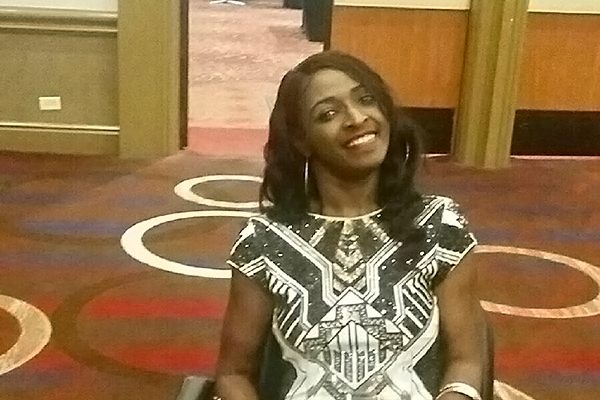Loving My Skin: Latest DDNJ Podcast
 As a woman of color who was born with cerebral palsy, Shari Cooper has faced many difficult challenges. In the latest DDNJ podcast, Matthew Wappet, the Institute for Disability's Executive Director, talks with Cooper, author of "Loving My Skin: A Self-Advocate's Perspective from Dayton, Ohio," about her experience with self-advocating.
As a woman of color who was born with cerebral palsy, Shari Cooper has faced many difficult challenges. In the latest DDNJ podcast, Matthew Wappet, the Institute for Disability's Executive Director, talks with Cooper, author of "Loving My Skin: A Self-Advocate's Perspective from Dayton, Ohio," about her experience with self-advocating.
"When it comes to race, and gender, and disability, it's a hard pill to swallow," Cooper said, "if you’re not strong enough, you won't stay in the room. But we need more people in my intersectionality to be in the room to share awareness so you can help other people that look like me."
Cooper shares how being a minority has brought a feeling of isolation and discomfort in everyday events. One of the most challenging experiences she has faced was transitioning into public school. As a seventh grader, she had to "deal with people staring and making fun." She later joined a disability council and felt lonely being one of the only black members in the group. "I really didn't talk that much because I felt like, "What if I say anything? I will be voted down quickly because I'm the only one besides my other colleague in the room that was like me. And that very scary."
Every group or type of individual must be represented in leadership. "A lot of the leadership in the disability rights movement has been white, middle-class people," said Dr. Wappett, the podcast's host. "And yet, everybody suffers from disability or experiences disability. Whether you're black, Hispanic, Asian, whatever, disability affects everyone. ... So be proactive, find opportunities to get involved."
"People usually don't want to talk about race and disability, and gender," Cooper said, "but that is the only way we are going to learn, is by talking about it.
"I want the listeners to remember: advocate. 'Advocate' comes in all shapes and colors. In order to have a good conversation, you need to involve more than one certain type of person. You need to get out and look around and see how you can have an array of people around the table. Because you cannot have a meeting without it especially if you are supporting people with disabilities of all colors."
If you want to be an advocate but struggle with speaking out, consider finding a social support network. Dr. Wappett said, "Finding organizations that can help you get connected can be so important to not just your independence and your advocacy, but also your mental health and how well you feel about how connected you are to your community.
'Independent Living Centers (ILC) are often overlooked resources in our community. They help you figure out what you need to live on your own. But also, I think people don't recognize they do a lot around teaching advocacy and how to how to speak up for yourself, and how to get involved. They provide opportunities for that."
"Not only that," Cooper said, "but if you are looking for a career, that's a great way to start connecting. Some of my best friends come from the ILC. You need that comradery even when you are not working. You might just want to go out and have a drink with a friend. Everybody needs a friend, so the ILC Center is a great way to start."
If you are interested in learning more about Independent Living Centers or self-advocacy, click on the link above to start listening to the DDNJ podcast. Learn more about the journal and its companion podcast on our website. Subscribe to DDNJ Author Insights on Apple Podcasts, Spotify and Google Podcasts.

